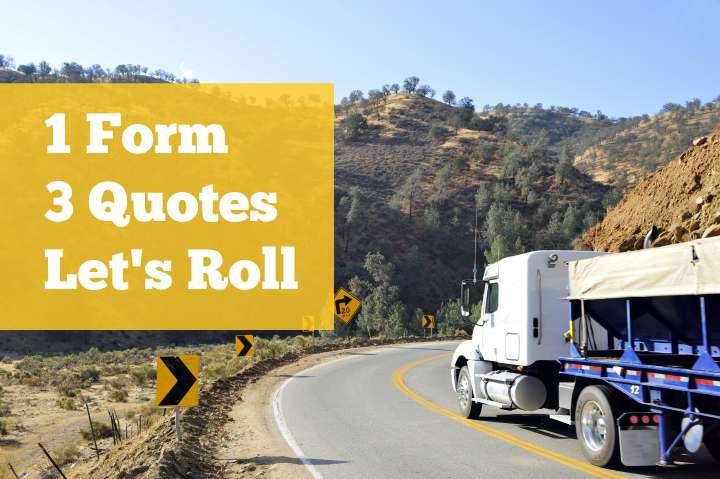Owner Operator Insurance can be expensive. The only way to make sure you aren’t overpaying is to get multiple quotes.
We make it easy for you to find the best deal by bringing you 3 agents that will compete for you business. It’s fast and free!
Insurance for Owner Operators
Whether you’re an owner operator running under your own authority, or you are leasing on, you already know trucking isn’t just a job – it’s a livelihood. Whether you’re hauling regionally or crossing state lines, having the right commercial truck insurance is essential for protecting your business, your assets, and your reputation.
But what exactly do you need, and why is it so critical? Below, we’ll break down the cost, the key types of coverage, explain the importance of regulatory, and explore frequently asked questions.
Owner Operators with Own Authority Insurance Cost
The cost for Insurance for Owner Operators with their own authority ranges from $8,000 to $15,000 per year. Of course there are outliers depending on the unique insurance needs of different truckers.
When you’re operating under your own authority, you’re fully responsible for insuring yourself, your truck, your cargo, and sometimes even the trailers you haul. Unlike being leased to a motor carrier (where the carrier may handle a portion of the coverage), you must meet federal requirements and handle all filings on your own. This can be a daunting process, but having the right insurance policy can keep you legal, safe, and in business.
Leased-on Owner-Operators Insurance Cost
Leased-on Truckers pay around $2,500 to $4,000 per year for insurance. The main driver of this is that when leasing on, you don’t need your own primary liability insurance coverage. You just need bobtail, which is much cheaper.
This can be an excellent way to structure your trucking business if you are just starting out. It’s also a good way to restructure if your current loads aren’t generating enough profit.
Owner Operator Insurance 101 – Essential Coverages
Primary Liability Insurance
Primary Liability (often called Commercial Auto Liability) is the cornerstone of any owner operator policy. It covers bodily injury and property damage to others if you’re at fault in an accident. The Federal Motor Carrier Safety Administration (FMCSA) typically requires a minimum liability limit of $750,000, though most owner operators opt for $1 million for extra protection (and to meet many shippers’ and brokers’ requirements).
Pro Tip: When you have your own authority, you’ll need proof of financial responsibility on file with the FMCSA, typically via BMC-91 or BMC-91X.
Physical Damage Insurance
Physical Damage coverage protects your truck, trailer and any permanently attached equipment in the event of an accident, theft, vandalism, fire, or other perils. It’s usually split into Collision (damages resulting from a crash) and Comprehensive (other non-collision incidents like theft or weather-related damage).
This coverage is not required by law, but if you’re financing or leasing your truck, you know this will be required. Even if your truck is paid off, this is smart to have as the cost is about 2-3% of the truck’s value per year.
Motor Truck Cargo Insurance
Cargo insurance is a must-have because it covers the freight you’re hauling. And you can’t get any loads without it! If the cargo is damaged or lost due to collisions, theft, or certain covered events, this policy helps pay for those losses.
Keep in mind that cargo policies often have specific exclusions or limits, so read the fine print to make sure your particular commodities are covered. This can’t be stressed enough.
Bobtail / Non-Trucking Liability
This coverage is mainly for Leased-On Owner Operators. It protects you during non-business use, such as driving to the repair shop or heading home after a delivery. If you’re not under dispatch, you aren’t covered by your Motor Carrier’s liability policy. Bobtail kicks in should an accident occur with your truck while you aren’t clocking billable miles.
Occupational Accident Coverage
Unlike a typical employee under a larger motor carrier’s workers’ comp policy, you’re on your own for injury protection if you’re an independent contractor. Occupational Accident coverage can fill this gap and cover medical bills, lost wages, and other expenses if you’re injured on the job. It’s not the same as workers’ compensation, but it’s a crucial layer of protection for those who don’t have access to traditional workers’ comp coverage.
General Liability
This will cover many risks that you will face that aren’t covered by your primary liability coverage. It’s usually around $500 per year and something to strongly consider.
Trailer Interchange
If you frequently haul non-owned trailers under a trailer interchange agreement, you’ll need Trailer Interchange coverage. It protects you from physical damage to the trailer itself when it’s in your possession. Without it, you could be on the hook for any repairs or replacement costs if something goes wrong.
Regulatory Filings and Requirements for Owner-Operators
MCS-90 Endorsement
The MCS-90 endorsement is required for interstate trucking companies. Essentially, it guarantees that you have minimum levels of financial responsibility in place. Even if your policy has exclusions, MCS-90 ensures there’s coverage for public liability claims, keeping you compliant with federal regulations.
BMC-91 and BMC-91X Filings
To maintain your own operating authority, you must file proof of insurance with the FMCSA through BMC-91 or BMC-91X. Without these filings, your authority can be revoked. Many new owner operators overlook this detail and risk hefty fines—or worse, a forced shutdown.
Cost Factors & How Truckers can Save
Trucking insurance is one of the biggest fixed expenses for independent owner operators, but also one of the biggest opportunities to save money. The money you can save on your policies will have a nice impact on your bottom line. The best way to save money on your owner operator insurance is to get quotes from more than one agent.
Owner operator insurance rates can vary widely based on many different factors. Here are a few factors that drive the premium that you have some control over.
- Credit scores affect your premium. Do what you can to raise your score and you will save money on your insurance.
- How much CDL experience do you have? Is your MVR clean?
- Do you have fog lamps or deer guards on your semi truck?
- Do you all the proper signage on your truck?
- Can you pay the premium in full? It’s usually cheaper to do this.
- Can you raise the deductible?
- If you are an O/O with authority the following are major factors in the rates:
- Do you have the right cargo insurance for the loads that you are carrying?
- Insurance companies are looking at your SAFER scores. Make sure the FMCSA data is correct. You don’t want to be rated higher because of a data error.
- Logbook violations are very common. Keep your’s up to date. Violations will increase your premiums.
Don’t forget to ask your truck insurance broker if there are any special discount programs that apply to your situation. A good agent will take the time to learn about your business and dig deep to find all the savings you are entitled to take.
Differences Between Being Leased On and Having Your Own Authority
When you’re under a permanent leased to a motor carrier, they typically handle portions of your insurance and filings. In that setup, your main responsibility might be physical damage or bobtail coverage only. However, with your own authority, you’re in charge of every aspect of insurance—liability, MCS-90, BMC-91, cargo, and more.
It also means you have total freedom over your hauls, routes, and clients—along with the full burden of compliance, paperwork, and insurance requirements.
Owner-Operator FAQ
- How much liability coverage do I need?
The FMCSA typically requires at least $750,000, but $1 million is a common industry standard—some shippers even ask for more. - What happens if I don’t file my BMC-91 / BMC-91X?
Your operating authority won’t be active, meaning you can’t legally haul for hire in interstate commerce. It’s crucial to have these filings in place before hitting the road. - Can I use my own authority for part-time work?
Yes, but even part-time operations require proper filings, liability coverage, and compliance with FMCSA regulations. - Do I really need Occupational Accident if I’m a sole proprietor?
If you’re not covered by a larger carrier’s workers’ comp, Occupational Accident helps protect you from lost wages and medical bills in case of a work-related injury. - How often to I pay for my insurance?
Most insurance companies let you pay in monthly installments with a couple months of premium for a down payment. Some require the whole year upfront, though. Usually it will be cheaper if you can pay the year up front because, if you look closely, paying monthly includes a financing charge. - How Quickly Can You Send Me a New Certificate of Insurance?
You don’t want to wait all day for your agent to send you a certificate of insurance. An unresponsive agent is a hidden cost, because the time you spend waiting is money that you’re not making. Ask your agent what hours he’s available and who you can contact when he can’t be reached. Better yet, will you have online 24/7 certificate access?
- How much liability coverage do I need?
Owner-Operator Resources and Next Steps
- FMCSA Website: www.fmcsa.dot.gov – Check out official regulations, filing requirements, and more.
- Truckers Report: Join the conversation and possibly find invaluable connections and support along your journey: https://www.thetruckersreport.com/truckingindustryforum/
- State Trucking Associations: Each State has their own association for truckers. You may want to check it out see what resources they have for you.
Save on Owner Operator Truck Insurance
Securing insurance for owner operators with their own authority involves more than just meeting the bare minimum. You want the best coverage at the best price. There are many choice that will meet your coverage needs. To get the best price you need those quotes and then can find the best price.
Operating under your own authority brings more risk, but more reward is possible. With over 1 million trucking companies, did you know almost 800,000 are owner operators with 1-2 trucks? Owner operators are truly the backbone of the trucking industry.
There is no substitute to comparison shopping. It’s tough because, as you know, most local insurance agencies don’t write or understand the nuances in a trucking insurance policy. We can help! We can bring you 3 agents that do write trucking insurance to compete for your business. With so many companies, and so many of them hard to get to, it really pays to shop around.
If you’re ready to get some comparison quotes, contact us today or click “Get Quotes” above. Our goal is to help you build the perfect insurance package that keeps you compliant, competitive, and fully covered. Safe travels and happy hauling!
Get 3 Quotes and Save!
Compare Apples with Apples – When comparing the cost of the quotes its important to keep track of the different coverage each policy has. You want to compare apples to apples. The trick is also to not get too much coverage or not enough coverage. In the trucking industry, some may argue that you can never have enough coverage.
No Gaps in Coverage – You need a policy that is just right for you and your business. The name of the game is to save money, but you don’t want to sacrifice coverage in order to do that. By talking with a few agents and getting multiple quotes you should be able to arrive at policy that has cost savings and adequate coverage.
Let 3 Truck Insurance Brokers Compete for your policy – The best way to save money on your semi truck insurance, is to look at multiple quotes. We have made that process easy. By filling out our simple form you can get 3 quotes from 3 different trucking agents for free. Good luck! Get started here.


